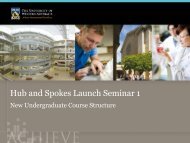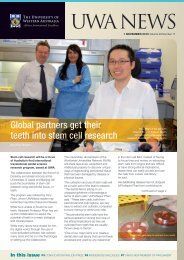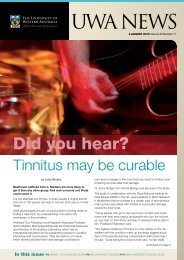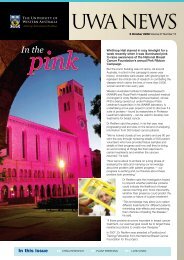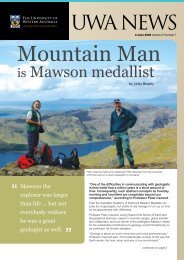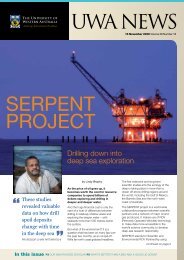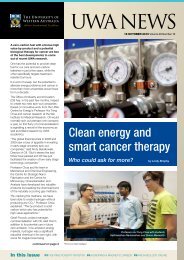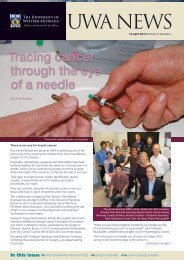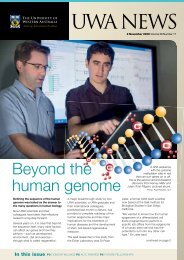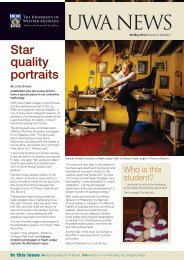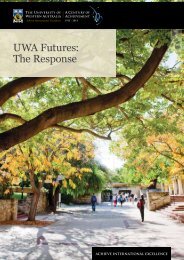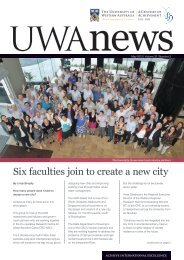Issue 13. 6 September 2010.pdf [PDF File, 1.7 MB] - UWA Staff - The ...
Issue 13. 6 September 2010.pdf [PDF File, 1.7 MB] - UWA Staff - The ...
Issue 13. 6 September 2010.pdf [PDF File, 1.7 MB] - UWA Staff - The ...
Create successful ePaper yourself
Turn your PDF publications into a flip-book with our unique Google optimized e-Paper software.
Gypsies help glaucoma research<br />
Gypsies are helping medical researchers to pinpoint the<br />
cause of a disease that can blind babies and young<br />
children.<br />
Congenital glaucoma is a rare subtype of the eye disease, in<br />
which children are born with a raised intraocular pressure that<br />
causes glaucoma. If it is diagnosed early, it can be rectified.<br />
Otherwise, babies can go blind within months.<br />
An international collaboration which includes the Lions Eye<br />
Institute Professor of Ophthalmology, David Mackey, and the<br />
WA Institute of Medical Research’s Professor Luba Kalaydjieva,<br />
has discovered a new gene associated with congenital<br />
glaucoma.<br />
Professor Kalaydjieva has an international reputation for her<br />
genetics research into the European gypsy, or Roma,<br />
populations. And Professor Mackey is renowned for his work<br />
on the genetics of glaucoma.<br />
<strong>The</strong>y started work together last year with their research<br />
partners.<br />
“<strong>The</strong> group had already identified one gene, that was found in<br />
about 20 per cent of Australian children with congenital<br />
glaucoma,” Professor Mackey said. “A second gene was<br />
identified in families from Pakistan and India, but we couldn’t<br />
find it in European Australians.<br />
“<strong>The</strong>n Professor Kalaydjieva joined us and we found the gene in<br />
gypsy families.”<br />
Congenital glaucoma is common in the Roma population, with<br />
up to one in every 2,000 children being affected, compared<br />
with the general Australia population of one in 30,000.<br />
Professor Kalaydjieva explained that gypsies are a founder<br />
population, derived from a small number of ancestors. <strong>The</strong>y<br />
intermarry and remain relatively isolated from surrounding<br />
populations.<br />
“<strong>The</strong> resulting limited genetic diversity makes it easier to find the<br />
genes responsible for all sorts of diseases,” she said. “It is<br />
easier than using a heterogeneous population.”<br />
<strong>The</strong>re are between eight and 10 million European gypsies but<br />
probably only 200,000 Roma people in Australia, although there<br />
is no accurate census data.<br />
Professor Kalaydjieva is originally from Bulgaria and started her<br />
genetic research with Roma people nearly 20 years ago. She<br />
found that they had some diseases that were unique to them<br />
(such as the high incidence of congenital glaucoma), while they<br />
often did not suffer diseases found in the wider population.<br />
“We must be careful, with out research, not to increase the<br />
stigmas already suffered by the Roma people but, at the same<br />
time, it is good news for them that we can work out how their<br />
problems are caused and help them to minimalise them with<br />
genetic screening,” she said.<br />
Luba Kalaydjieva from WAIMR and David Mackey from LEI are<br />
collaborating<br />
Celebrate your safety<br />
Do you feel safe at work?<br />
If so, perhaps the person or team who is responsible should be rewarded.<br />
<strong>UWA</strong>’s annual Safety Awards are seeking nominations of individuals and groups<br />
who deserve to be recognised for controlling risks, identifying hazards and<br />
safety planning, training and management.<br />
Nominations of individuals and groups should be based on the criteria used by<br />
WorkSafeWA: management commitment, planning, consultation, hazard<br />
management and training. Details of these can be found on the <strong>UWA</strong> Safety<br />
and Health website.<br />
A <strong>UWA</strong> Safety Leadership Award and a <strong>UWA</strong> Safety Recognition Award are<br />
also up for nomination. Written nominations for each of the four awards must<br />
be submitted to Safety and Health by Friday October 1.<br />
<strong>The</strong>y will be announced during Safe Work Australia Week, October 24 – 30.<br />
<strong>The</strong> University Co-Operative Bookshop will again donate book vouchers for the<br />
winners.<br />
If you would like help with writing your nomination, please call Safety and Health<br />
on 6488 3938.<br />
New Courses 2012<br />
Feedback Wanted<br />
With <strong>UWA</strong> Open Day still fresh<br />
in your mind, please take a few<br />
minutes to forward any<br />
feedback on how information<br />
about New Courses 2012 was<br />
managed at this year’s event.<br />
This may include questions you<br />
were asked on the day, how<br />
useful you found the ‘Pocket<br />
Guide for <strong>Staff</strong>’ and pre-event<br />
staff forums, or a suggestion for<br />
improvement.<br />
Feedback can be emailed to<br />
publicaffairs@uwa.edu.au or<br />
contact Rachel Schmitt on 6488<br />
7241.<br />
Visit http://www.newcourses2012.<br />
uwa.edu.au/register to register for<br />
updates on the new courses.<br />
10<br />
<strong>UWA</strong> NEWS 6 <strong>September</strong> 2010<br />
<strong>The</strong> University of Western Australia


![Issue 13. 6 September 2010.pdf [PDF File, 1.7 MB] - UWA Staff - The ...](https://img.yumpu.com/26619782/10/500x640/issue-13-6-september-2010pdf-pdf-file-17-mb-uwa-staff-the-.jpg)
